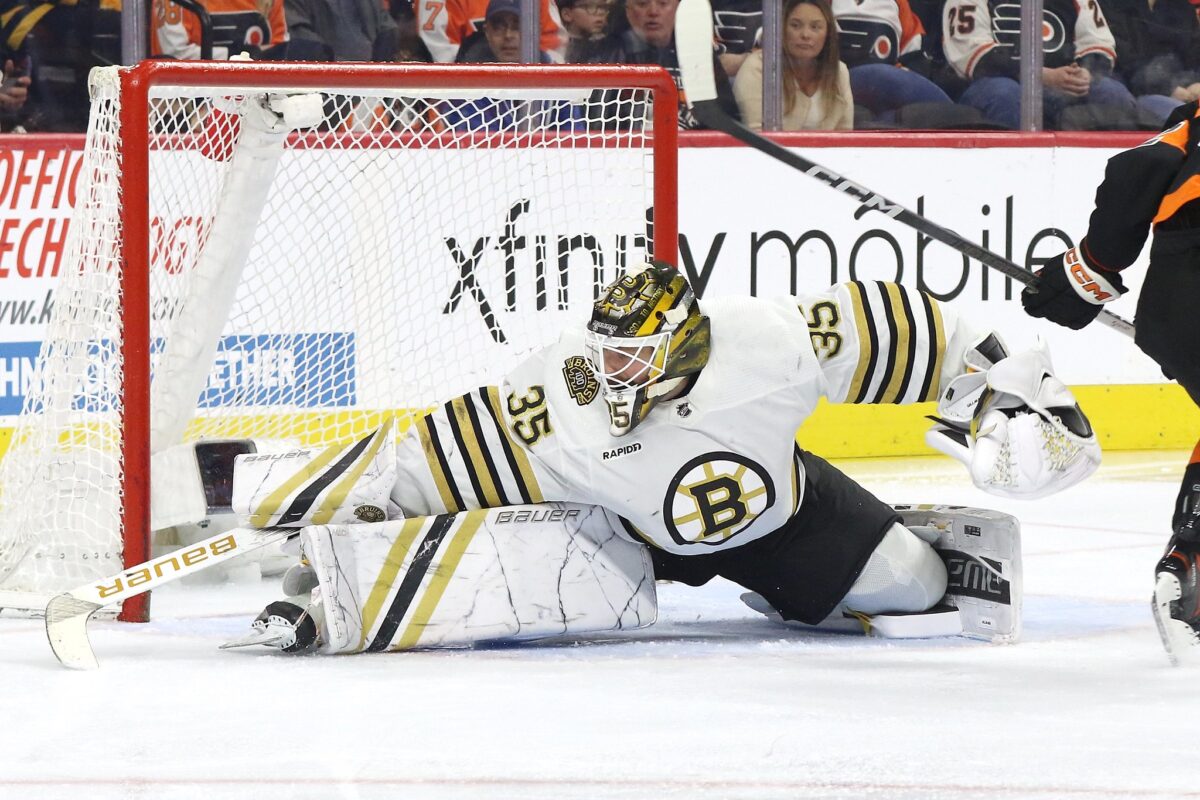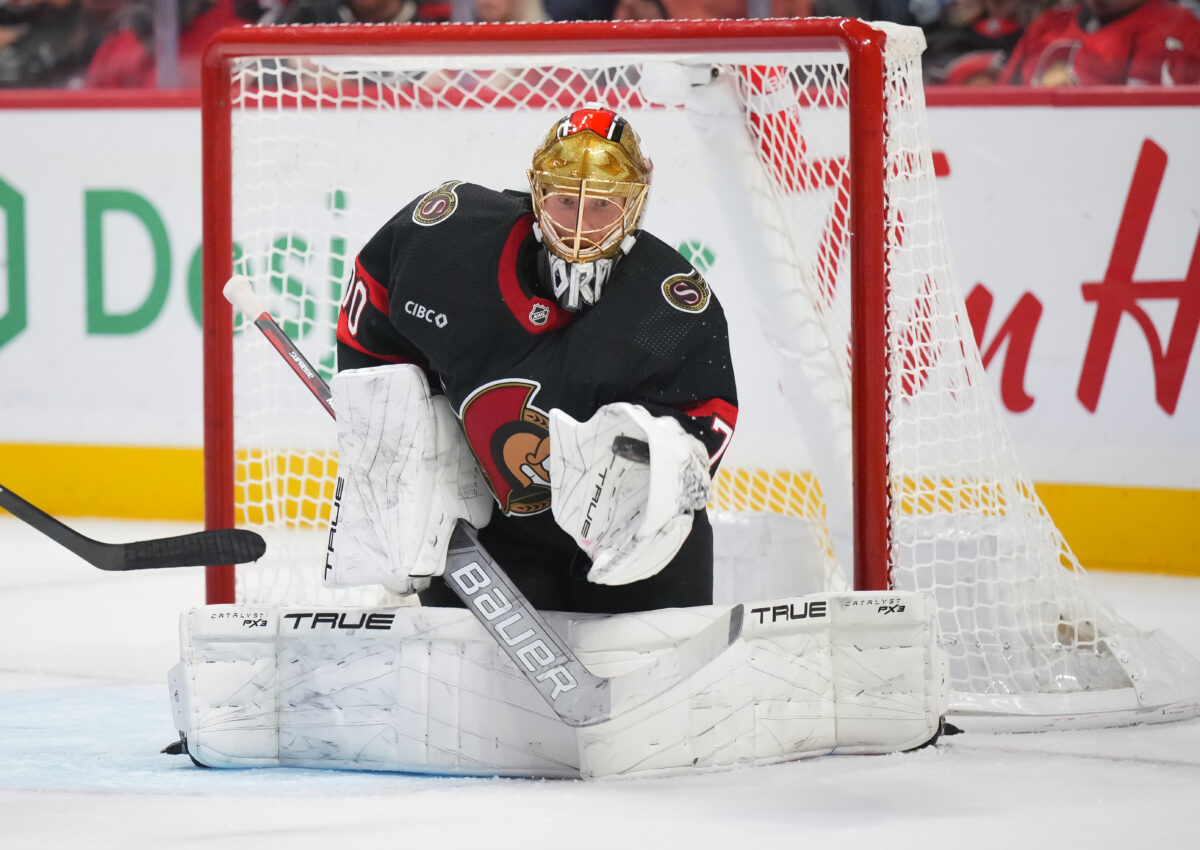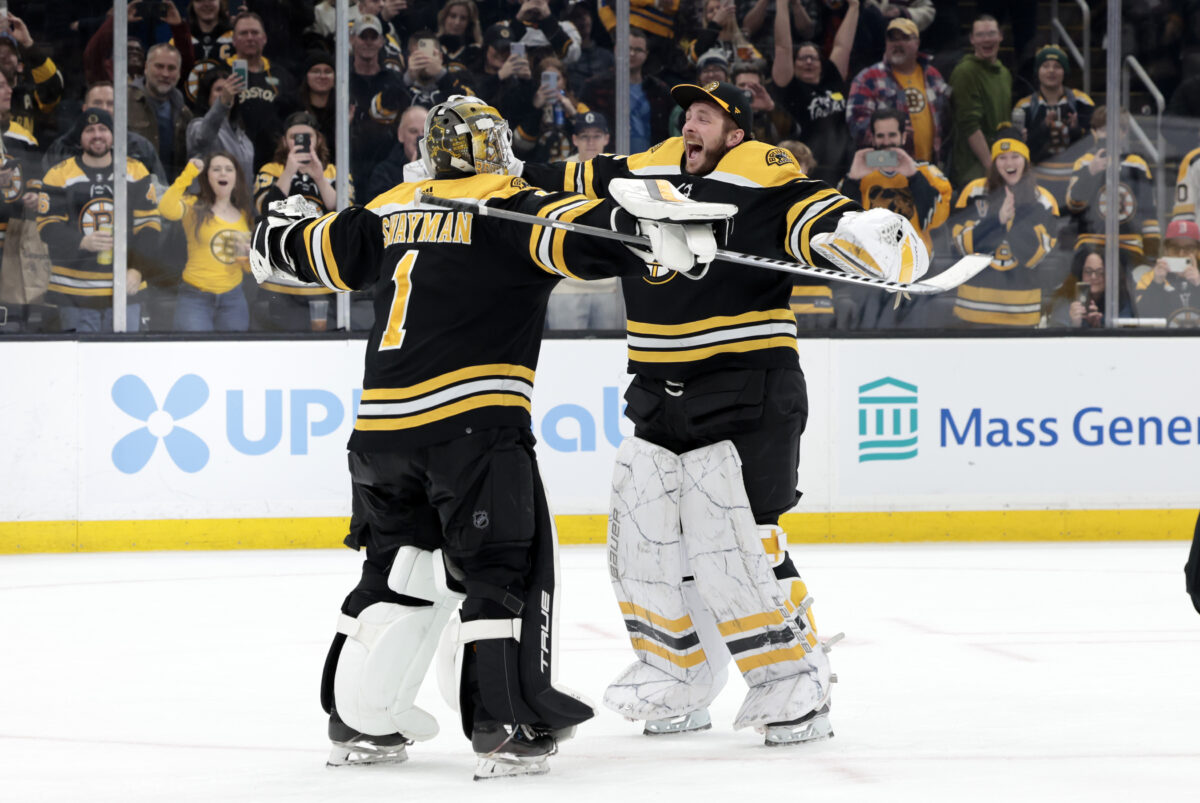It’s been almost two weeks since the Boston Bruins traded away goaltender Linus Ullmark. They had previously tried to trade him at this past season’s trade deadline to the Los Angeles Kings, but Ullmark himself shot down that trade with his modified no-trade clause. But trade rumors with the goaltender go back to last summer when there were questions about whether or not general manager Don Sweeney would move the goaltender to get into the first round of the 2023 NHL Draft. Coincidentally, that is exactly what he did two weeks ago.
Related: Bruins Need to Pay Jeremy Swayman Whatever He Wants
This trade certainly had people scratching their heads when it was first announced, and even now, it continues to raise some questions. I believe that the Bruins rushed into trading away Ullmark and could very easily regret it during the upcoming 2024-25 season. I also don’t think the return was strong enough for a guy who has been a backbone for the team and a huge part of their success the past two seasons. But let’s break it down below.
What the Bruins Lost
Ullmark is one season removed from winning the Vezina Trophy in 2023. While he didn’t have the same astronomical success that he did in 2022-23, he had a very good 2023-24 season and was a top goaltender in the NHL. He had a 22-10-7 record with a save percentage (SV%) of .915, and a 2.57 goals-against average (GAA).

Watching any Bruins game in the past two seasons, it’s almost immediately clear that the goaltending was the strongest part of the team’s game. Ullmark, along with Jeremy Swayman, were the best goaltending tandem in the NHL and stole several games for the team in front of them. They covered up a number of issues with this roster at times in the 2023-24 season.
Despite head coach Jim Montgomery’s plans to stick to the goaltending rotation during the 2024 postseason, Ullmark only started one game, Boston’s Game 2 loss to the Toronto Maple Leafs in the first round. But it’s important to note that he didn’t lose the starting job due to poor play. He actually played decently in Game 2, but Swayman was playing on another level, and Montgomery chose to ride the hot hand.
But the playoffs further cemented what many fans and clearly what people in the organization were beginning to think – the team didn’t need Ullmark when Swayman was clearly ready to be the clear number one guy. The need for a strong rotation was becoming less necessary, especially in the face of other areas the team was struggling in, particularly at the center position.
In some ways, trading Ullmark makes a lot of sense. Rather than having an even 50-50 split between goaltenders, they could give Swayman a bigger load and have a different goaltender in a more traditional backup role who could be cheaper than Ullmark’s $5 million cap hit. That money could be allocated elsewhere.
Still, losing Ullmark, even with the strength of Swayman’s play and his ascent into being a top goaltender in the NHL, is a blow for the Bruins and weakens an area of considerable strength for them. Again, he is only one year removed from winning the award for best goaltender in the NHL and has not had a real dip in production since then. Trading him is a loss for the team, but if given a big enough return, could be a necessary sacrifice to go all in on being a Stanley Cup contender in 2024-25.
What the Bruins Gained
This brings us to what the Bruins received from the Ottawa Senators for one of the top goaltenders in the league. This is where opinion starts to swing, and the trade goes from being a necessary sacrifice to a questionable decision.
The Bruins received one of the Senators’ first-round picks in the 2024 Draft, pick number 25, center Mark Kastelic, and goaltender Joonas Korpisalo with 25% of his $4 million salary retained by Ottawa. It isn’t necessarily the return fans would have expected or liked for Ullmark. Kastelic adds to Boston’s center depth but hasn’t quite found his footing in the NHL yet. He had five goals and 10 points in 63 games last season. Meanwhile, Korpisalo is coming off one of the worst seasons of his career after signing a five-year, $20 million contract last summer. He had a 21-26-4 record with a .890 SV% and a 3.27 GAA.

The Bruins’ ultimate desire for this return was obviously the first-round pick, which the front office used to select Dean Letourneau. Boston had not selected in the first round since the 2021 Draft due to a variety of trades they’d made at the deadline the past few seasons to make a competitive push in the postseason. While the team’s prospect pool is not necessarily as weak as some may think, they are lacking more “exciting” prospects, for lack of a better word. Getting a first-round pick is certainly an important boost to the pipeline.
Even with the first-round pick, there are a lot of question marks in this return, which is surprising given the quality of an asset like Ullmark. Even if the market wasn’t quite as strong as the front office would have liked, one would still think the Bruins would have been able to get a guy who could bring more of a certain/known impact. Kastelic falls in line with a lot of young players in the Bruins’ system right now who could become a legitimate NHL player, but haven’t proven themselves yet and don’t seem to have the highest of ceilings. Korpisalo has had great moments in his career, but again, who knows if he’ll be able to bounce back from last season. He could work very well as a backup to Swayman, but is a backup goaltender really worth trading Ullmark? There’s a lot to be excited about Letourneau, but he’s still just a prospect, and who knows when/if he’ll be ready for the NHL.
Win Now or Building for the Future in Boston?
The added fascination to this trade is a question that has lingered around the Bruins for a few seasons now and, I think, is epitomized by this move. Are the Bruins in win-now mode or build-for-the-future mode? The Bruins had the cap space to sign a center during free agency without trading Ullmark, and at the end of the day, they really only created around $2 million of cap space with the trade.
The Bruins have the longest active playoff streak in the NHL and have been retooling on the fly the past few years. They’ve had a major turnover with the retirements of Zdeno Chara, Tuukka Rask, Patrice Bergeron, and David Krejci but have managed to almost seamlessly transition to their new core with Swayman, Charlie McAvoy, Hampus Lindholm, and David Pastrnak, with Brad Marchand remaining as the connecting piece between the old and new guard. This new core also isn’t incredibly young anymore with Pastrnak set to enter his 11th season in the NHL and McAvoy nearing a decade. It’s reaching the point where they need to win in Boston sooner rather than later, especially for Marchand, who is in the final few seasons of his career.
Trading one-half of the major reason for your success the past two seasons is a bit questionable when you’re in win-now mode. The Bruins have been lucky to avoid a major rebuilding year and have continued to keep their championship window open long beyond what people expected. But you can’t have it both ways and always be rebuilding on the fly. You can’t trade away a major piece for a draft pick and be just as competitive. After the past few weeks, I don’t know if Sweeney has necessarily made this a better team or not that will be a real threat for the Stanley Cup this upcoming season. Yes, Swayman is a top goaltender, but will he be able to make up for other areas of weakness for the Bruins on his own like the tandem did this past season?

2024-25 will certainly be an interesting one for the Bruins. They’ve spent significant money to bring in center Elias Lindholm and defenseman Nikita Zadorov, which are definite upgrades to the roster. But are they big enough upgrades to account for the fact that the team won’t have a top-tier goaltender in net every single night like they did in 2023-24? Swayman is a superstar, but he can’t play every game of the regular season like he can in the postseason. The Ullmark trade didn’t bring in assets to immediately address roster issues while losing a major part of the reason for the team’s success, and the team could regress next season.
I could very easily be wrong and hope to be so. The Bruins could come out swinging, and the free agency additions alone solve the roster issues, and they’re easily the top team going into the 2025 NHL Playoffs without Ullmark. They could easily continue to have it both ways. Kastelic could be a serviceable bottom-six center, and Korpisalo could thrive in a more backup situation. Then, down the road, they get a really great addition in Letourneau, who makes the roster within the next two seasons and is the center Boston has been waiting to come out of their own pipeline for over a decade.
But this trade does certainly raise some eyebrows about how the front office views this team, the levels of confidence they have about going all in on this current roster, and how legitimate of a contender they will be in 2024-25.
Who Won the Trade?
At the moment, I think it is pretty easy to say that the Senators have won the trade. They get an established, talented player who is coming off of a great season and most likely will be able to be an impact guy on the ice. Most importantly, they didn’t really lose that much. Korpisalo was a guy they were considering buying out, Kastelic hasn’t really panned out yet in the NHL, and they only lost the 25th overall pick in the draft, getting to hold onto seventh overall. Even if Ullmark completely bombs in 2024-25 (which I highly doubt), this trade is really no skin off of their backs.
For Boston, as already mentioned, there are a lot of unknowns with this return, not only in the assets they received, but in how the loss of Ullmark is going to affect the roster. With him entering the final year of his contract, would it really have been such a bad thing to continue to have a strong goaltending tandem and go all in for 2024-25? Yes, Swayman is certainly ready to be the number one guy, but there is nothing wrong with having two strong goaltenders on a roster. It may have stung a bit to lose Ullmark to free agency next summer, but are the assets they got from the trade really worth that much? Again, the optics around this trade would be a bit better if they had managed to address one of the immediate roster issues in the return.
Related: Bruins Lysell and Merkulov Could Compete for Top-6 Role
At the end of the day, the Bruins may have telegraphed their hand a bit too much. The rumors last summer, the beginning of the season, and the failed deal at the deadline all made it abundantly clear to GMs around the league how eager Boston was to trade Ullmark, and I wouldn’t be surprised if that played a factor in their return. I think if they had been more content to ride out Ullmark’s contract, they might have been able to wait for a better deal at this year’s trade deadline or get a better one this summer if they hadn’t been so eager during the season. Ullmark’s no-move clause is also important to note here, limiting their options and bargaining power, but I still wouldn’t be surprised if their previous failed attempts played a factor in this deal.
The Bruins are looking like they’ll be the loser of this trade, but I wouldn’t close the door on history remembering it a bit more fondly in the years to come, and a lot of it will hinge on the success of Letourneau. If he grows into the Bruins’ best “homegrown” center since Bergeron and Krejci, then this will seem like more of an even trade. Boston has not been able to draft and develop a center to be an impactful player for the team since those guys, but hopefully, they finally have an answer to that struggle in Letourneau.
